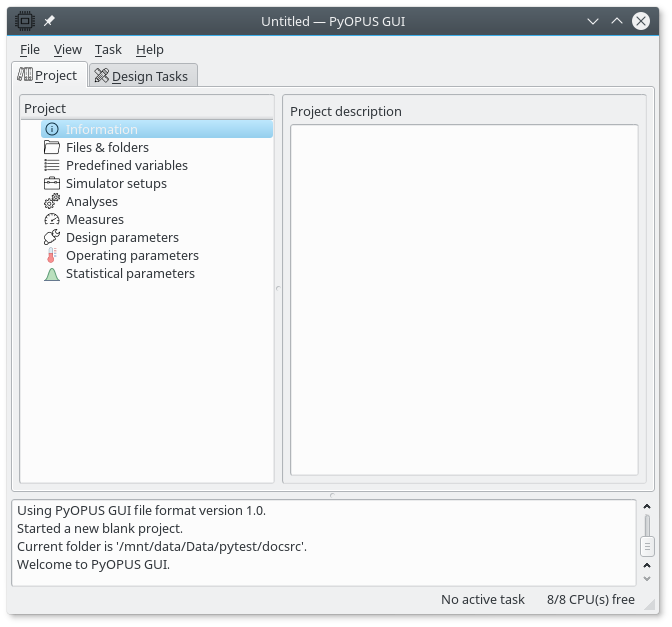11.1.2. The GUI window
The title bar of the GUI window displays the name of the current project. The GUI window is divided in several parts:
The menu bar with basic commands.
Tabs for accessing the project, design tasks, results, logs, etc.
Main part showing the active tab’s content
Messages
Status bar showing the active design task’s status and the number of free/available CPUs across the defined machine cluster.

The GUI window.
When the GUI is started it first looks for a config file (pyopusgui.config)
in the current directory. Next, the host name is detected and the number of
available CPUs on the host where the GUI was started. The GUI searches for
supported simulators and when it finds one it displays its location on the
host where the GUI was started.
The MPI launcher is detected and its location is printed. The list of
directories available to all machines in the cluster (mirrored storage) is
displayed. It can be set with the PARALLEL_MIRRORED_STORAGE environmental
variable (see pyopus.parallel.base for details). The local storage
on the host where the GUI was started is printed (can be set with the
PARALLEL_MIRRORED_STORAGE environmental variable, see pyopus.parallel.base
for details).
A typical output in the message window looks like this:
Failed to load '/mnt/data/Data/pytest/docsrc/pyopusgui.config'. Using defaults.
Running on host 'calypso' with 8 CPU(s).
Found local simulator Synopsys HSPICE: /sw/hspice/linux/hspice
Found local simulator Cadence Spectre: /sw/cadence/MMSIM121/tools/bin/spectre
Found local simulator Spice Opus: /usr/local/bin/spiceopus.bin
Found MPI launcher: /usr/bin/mpirun
Local machine's VM mirrored storage:
-- 1: /home/arpadb
-- 2: /mnt/data/Data/pytest
-- 3: /home/arpadb/pytest-3
-- 4: /mnt/data/Data/pywork
Local machine's VM local storage: /tmp
Using PyOPUS GUI file format version 1.0.
Started a new blank project.
Current folder is '/mnt/data/Data/pytest/docsrc'.
Welcome to PyOPUS GUI.
The printed information is for debugging purposes only. It does not impose any limitations on the options available in the GUI. It can, however, be helpful when you are trying to find the cause for a problem.